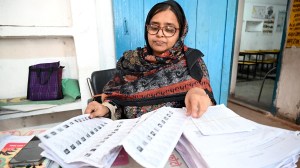Stay updated with the latest - Click here to follow us on Instagram
Forced to shut by pollution body, Haryana’s rice mills say decision defies logic, will lead to losses
For continuous process industries like rice mills that run on energy generated by burning paddy husk, the restricted timings are tantamount to closure, according to Vijay Setia, former president of the All India Rice Exporters Association.
 The committee taking these decisions seems to lack experts who can advise them, Setia said. There are around 280 mills in Karnal and 500 in NCR, he said. (Representative Image)
The committee taking these decisions seems to lack experts who can advise them, Setia said. There are around 280 mills in Karnal and 500 in NCR, he said. (Representative Image)Most rice mills in Haryana’s Karnal have recently fallen silent, unusual for this time of the year when the paddy harvest is complete and processing should have been in full swing.
An order issued by the Commission for Air Quality Management (CAQM) on December 2 said that industrial operations and processes that do not run on PNG (piped natural gas) or “cleaner fuels” in the NCR will be allowed to function for only up to eight hours a day from Monday to Friday.
But for continuous process industries like rice mills that run on energy generated by burning paddy husk, the restricted timings are tantamount to closure, according to Vijay Setia, a mill owner in Karnal and former president of the All India Rice Exporters Association.
Explaining that the CAQM’s orders were imposed thoughtlessly, Setia said that the parboiling of one batch of paddy of 24 or 32 tonnes is a long process that includes soaking it for 8 to 10 hours, steaming, and drying for about 10 to 12 hours. If the process is disrupted and the rice is not dried, the moisture can spoil it or reduce the quality.
Piled up sacks of unprocessed grain are worrying for mill owners and exporters. While Setia has around 25,000 tonnes of paddy waiting to be processed, Vishal Khanna, another mill owner in Karnal, said he had close to 1 lakh tonnes.
Khanna’s unprocessed stock includes the pile he is required to mill for the government — rice that will end up in the public distribution system. “If the rice is not processed quickly, the moisture makes it smelly and it won’t sell. If the shutdown continues, mills will begin to sell desperately, pushing prices down,” he said.
“To process one batch of paddy, the boilers need to run continuously. It takes at least two hours to restart a boiler that has been shut down, leaving only six hours of that stipulated time behind. We cannot do anything in six hours,” said Khanna, whose mill is also not running.
On Thursday, at Setia’s large mill spread over 28 acres, only the sorting and packing sections were functioning. The furnaces and boilers that generate the steam for paddy processing and the parboiling plants were idling, as were the machines for cleaning, de-stoning, husking, and polishing. Unable to process the paddy, workers were cleaning parts of the mill, said Setia, after a staffer asked him if there were any orders for rice.
Mill owners said this is possibly the longest such shutdown that has been forced on them, since they were exempted even during the Covid lockdowns. Setia remembers a brief shutdown ordered two years ago that was withdrawn soon.
“If mills switch to alternative fuels, how is the husk to be disposed?” Setia asked. Besides, the energy from husk constitutes biofuel, which means that the mills are not burning fossil fuels, he said, adding that continuous emission monitoring devices are installed to measure emissions from the stack and relay data to the Haryana pollution control board.
The committee taking these decisions seems to lack experts who can advise them, Setia said. There are around 280 mills in Karnal and 500 in NCR, he said.
The disruption can throw exports out of gear as well, said Vinod Kaul, executive director, All India Rice Exporters Association. Rice is exported to around 160 countries, with basmati rice mainly being exported to the middle eastern countries and non-basmati being exported to the African continent, he said.
Having approached the Chief Minister of Haryana and writing to the CAQM directly with no results, the All India Rice Exporters Association has filed two applications in the Supreme Court, requesting its intervention in the matter and asking to be exempted from the orders of the CAQM.
“We have forwarded the details to the CAQM and requested them to take a decision,” said a senior official of the Haryana PCB. Explaining why this could be the first time that the functioning of mills has been restricted for this long, he said that earlier, there was no ban on non-PNG industrial units or those that don’t run on cleaner fuel.
In an order issued on Wednesday in response to requests from the UP government, the CAQM allowed sugar mills to run in the NCR districts of UP, Haryana and Rajasthan.
The Supreme Court on Friday had directed the CAQM to examine the requests of industries and organisations on the relaxation of the restrictions imposed. The CAQM is expected to consider these requests in a week.
Both rice husk and bagasse (used as fuel in sugar mills) are biofuels, Setia said on Saturday. But sugar mills have been allowed to function, and rice mills are still awaiting approval, he said.







